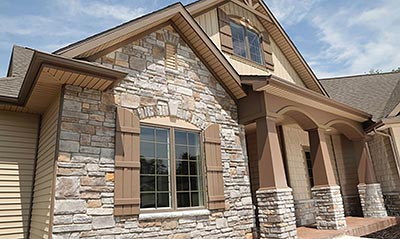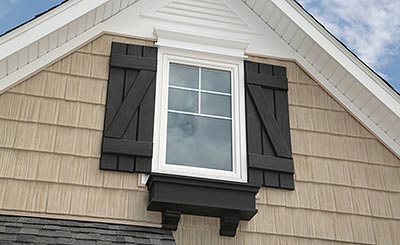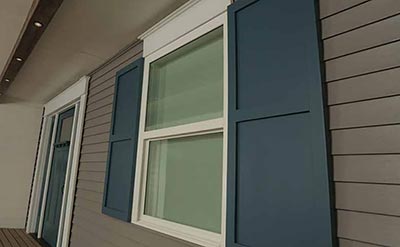An Introduction to Decorative Shutter Styles
by Rachel Lyon, Editorial Director for The House Designers®
When it comes to the finishing touches on your home’s exterior, the little things go a long way! If you plan to accent windows with shutters, you do so knowing they’ll add charm, but are you sure it’s the right kind? There are no standard shutters—you’ll find a variety of options to complement and create different aesthetics. Here are the most common decorative shutter styles you’ll come across!

Board & Batten Shutters
A common choice, board and batten shutters are available in just about any size and shape. They are defined by having joined boards—that is, no space is visible between the vertical slats. The closed look is pretty adaptable and works well with most types of homes. You might consider board and batten shutters over other styles if you have a traditional, Cape Cod, or European home, but don’t be afraid to add them to almost any other type of house.
When comparing options, you’ll see different numbers of boards and battens available. Two or three of each is common, with wider boards looking more rustic. You can personalize the aesthetic with the arrangement of battens—would you like them placed across the top and bottom portions, at both far ends of the shutter, or in a Z-pattern with one laying diagonally between the other two?
The archetypal shutter in this category has two horizontal battens placed a symmetrical distance from the top and bottom. This is the shutter most people immediately imagine due to its sheer popularity through history to today, so it’s a safe bet. And while you don’t see end or Z battens as often, they might be the point of interest needed to increase curb appeal and make your home stand out.

Plank Shutters
Plank shutters include vertical boards and batten arrangements the same as detailed above, but they do not have joined boards. Visible space between the slats creates an extra rustic and time-worn look that homeowners love, as it gives character to newly constructed cottages and farmhouses that have yet to earn their charm the old-fashioned way. If your exterior design is a little too fresh for your liking, plank shutters can deliver a dose of what you’re looking for. Whether painted to project age or brightly to highlight, this style proves that a little space goes a long way toward an impression.
If negative space sounds like a cool way to give your home personality, you don’t have to stop at what you get between the boards. Diamond cutouts—created by taking a triangular notch out of each slat so the full shape is seen when they’re put together—are a great way to dress up an otherwise simple home like a classic ranch. Perhaps this piques your interest? Talk to a professional about custom cutouts to give your house a truly one-of-a-kind exterior design!

Panel and Louvered Shutters
Finally, we come to panel and louvered shutters that, while different, share a couple of characteristics. Using rail and stile construction, they are significantly more complicated than their board and plank counterparts. Panel shutters can have raised or recessed panels and have a solid look to them—think like a door—and louvered shutters have a solid frame with rows of tilted slats—similar to blinds. Historically, these two were often seen together, with panels being used to maintain privacy on the first story and louvers used to let in the breeze on higher levels.
Due to their comparative sophistication, panel and louvered shutters are favored for stately homes including colonial and Southern types. Georgian, Federal, and Neoclassical styles all look best with these shutters, not only because they fit their flair, but because they provide some much-needed texture on their façades. Architectural styles that pride themselves on skilled craftsmanship also do well dressed up within this category, and beach houses look great with louver shutters, of course.
If you’re in the market for stylish shutters, check out the weather- and insect-resistant polyurethane options from Fypon®! They offer quick installation now and years of low maintenance to look forward to, no matter which style you choose. And with rectangular, quarter-round, and elliptical shapes to complement your windows as well as decorative accessories like hinges and clavos for even more architecturally correct curb appeal, you can really transform your home. Not sure what you want? Free expert assistance is available to ensure that you love the final product!